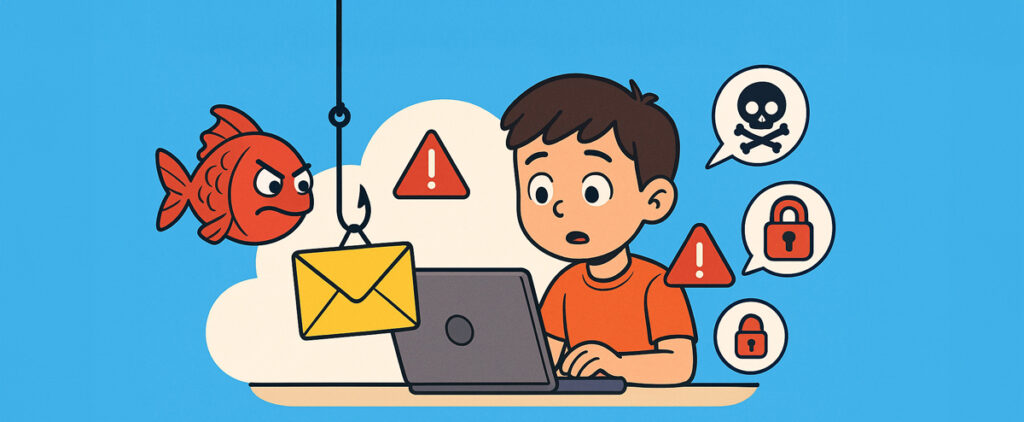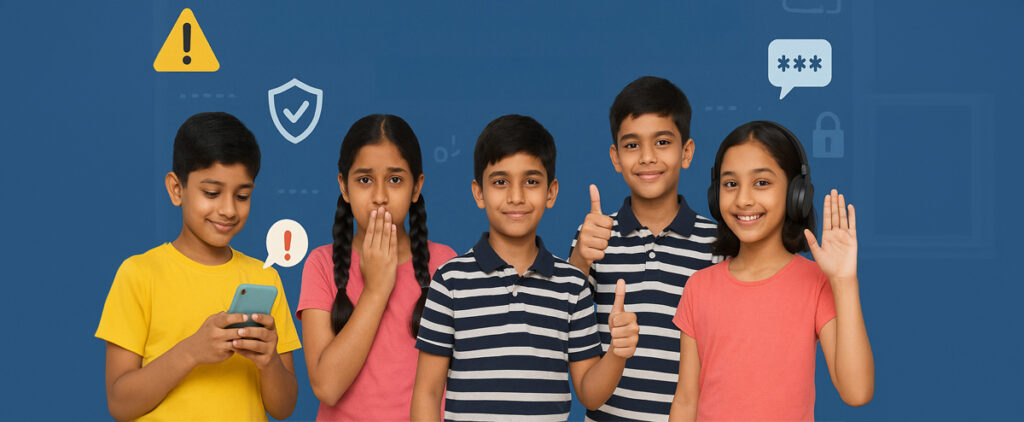
P laying online games is extremely popular with children in India be it mobile games, or console and PC games like Fortnite and Minecraft. Although it allows for self-expression, enhances problem-solving skills, and can be enjoyable, it
also leaves room for numerous online risks.
Top Reasons to Ensure Safe Gaming
1. Cyberbullying and Harassment
- Bullying Escalation: Friendly competition can quickly devolve into bullying, with some players intentionally disrupting the game or targeting others.
- Doxxing: In extreme cases, attackers may share personal information, photos, or videos of players without consent.
Tip: Teach kids to block/report bullies. Keep screenshots of harassment and notify game moderators.
2. Malware and Viruses
- Unofficial Downloads: Games obtained from unofficial websites or unauthorized app stores can be a breeding ground for malware.
- Harmful Files: Opening files sent by other players can expose the device to viruses that damage systems or compromise sensitive data.
Tip: Ask your child only to download from trusted developers. Use cybersecurity software and scan all new apps or updates.
3. Online Predators
- Grooming Tactics: Predators may exploit the social aspects of gaming to manipulate and groom young players.
- Escalation Beyond Gaming: There have been instances where interactions transition into real-world dangers.
Tip: Create a no-judgment zone where children can talk about anything they encounter online.
4. Scams
- In-Game Economies: In games that involve trading items for real money, children might fall prey to scams under the guise of purchasing “upgrades” or “bonus”.
- Fake Transactions: Cybercriminals often target unsuspecting children, resulting in financial loss.
- Account Hijacking: If a gaming account is compromised, hackers can steal personal data.
Tip: Enable password protection for in-game purchases. Disable one-click payments and monitor spending.
5. Addiction
- Excessive Play: Without boundaries, gaming can interfere with social development, disrupt sleep, and negatively impact academic performance.
- Dependency: The rewarding nature of games may lead to an unhealthy focus on virtual achievements over real-life interactions.
Tip: Promote breaks, exercise, and diverse hobbies. Set up routines that integrate gaming with other responsibilities.
How Indian Parents Can Keep Their Kids Safe While Gaming
1. Understand What They’re Playing: Ask your child to show you the game they love. Watch a few matches or play with them. It will help you understand whether it’s age-appropriate, who they’re interacting with, and if the content is safe.
2. Download Only from Official Sources: Avoid pirated games from torrent websites or unknown APKs. These often carry malware. Instead, stick to:
- Google Play Store (for Android)
- Apple App Store
- Trusted platforms like the PlayStation Store
3. Use Antivirus and Security Apps: Install reliable antivirus software (e.g., Quick Heal, Kaspersky, Norton) on all gaming devices, especially in mobile phones, which are most commonly used in India.
4. Secure Their Gaming Accounts: Make sure your child uses a strong, unique password and they never share login details, even with friends. Enable Two-Factor Authentication (2FA), wherever possible.
5. Use Built-in Parental Controls: Most consoles and apps offer parental control features. Here’s how to activate them:
- PlayStation: Go to Settings > Family and Parental Controls to restrict chat, screen time, and content
- Xbox / Windows PC: Use the Xbox Family Settings app to manage communication and spending.
- Nintendo Switch: In System Settings > Parental Controls, restrict game downloads and chat access.
- Steam (PC): Use Family View to limit games and set a PIN for restricted features.
- Mobile/PC: Turn on parental filters to block inappropriate chats or disable messaging. Use Google Family Link or Apple Screen Time to control downloads, purchases, and usage time.
6. Control In-Game Spending: Kids often make impulsive in-game purchases using stored card details or UPI. So, avoid storing UPI or card details on gaming platforms and set up SMS/email alerts for all transactions.
7. Teach Them about Online Privacy: Ask your child to choose anonymous usernames (like ShadowRider25) instead of real names or school info. Discourage them from sharing real photos, school and city names, as well as phone numbers.
8. Consider Using a VPN: A VPN (Virtual Private Network) hides your child’s IP address, keeping their location private.
9. Check if a game is age-appropriate: Refer to PEGI (Europe) or ESRB (US) ratings, and read parent reviews on Google Play.
More than 90% of children over the age of 2 play video games, and many parents feel out of their depth. But the best way to ensure safety is not about controlling them, but it is about connecting with them. Play with your child. Let them teach you. Use gaming as a window into their world, and build the trust that keeps them coming back to you, not just for help with tough levels, but also for help with tough situations. Open communication, regular monitoring, and proactive technical controls are vital in fostering a secure gaming environment and nurturing them into becoming responsible digital citizens.



 Minors
Minors 







